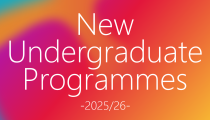Sept 2025 Entry
4 years
132 credits (including 27 Clinical Education credits) for BScST (subject to approval)
- Applicants should be able to communicate verbally in both Cantonese and English effectively. Additional proficiency in Mandarin (Putonghua) is preferred.
Students will be awarded the following degree upon successful completion of the graduation requirements:
- BSc (Hons) in Speech Therapy
Contingent on successful accreditation of the programme by the Hong Kong Institute of Speech Therapists (HKIST), BScST graduates will be qualified to practise as speech therapists in accredited register.
What's New
Programme Aims
-
To produce collaborative practice-ready speech therapists with the ability to practise speech therapy safely and effectively in the areas of speech, language, voice, fluency and swallowing with children and adults presenting with developmental and acquired communication disorders and swallowing disabilities.
-
To equip students with the professional and academic knowledge base, clinical and research skills, and attitudes and ethics required to function effectively as entry-level speech therapists.
-
To cultivate graduates who are able to practise as speech therapists in Hong Kong and serve as speech therapy advocates in mainland China and the Macau SAR.
Programme Characteristics
-
The curriculum offers a unique approach to education and training in Cantonese, Mandarin and English, addressing speech therapy in both Chinese and bilingual contexts. A hybrid teaching and learning approach is adopted: traditional lectures are conducted in the first year, and the problem-based learning (PBL) approach is adopted in the second year.
-
The curriculum offers over 300 hours of supervised clinical practicum.
-
The curriculum of this undergraduate programme builds on the success of our self-financed Master of Speech Therapy programme, with added emphases on interdisciplinary approaches to rehabilitation and evidence-based practice underpinned by the latest research conducted at CBS.
-
The teaching team is composed of academic and teaching staff with considerable teaching experience, proven research track records and extensive clinical expertise.
-
Accreditation for the programme will be sought from the Hong Kong Institute of Speech Therapists (HKIST), the local professional body responsible for regulating the speech therapy profession and conducting Institution-based Assessment for Speech Therapy Education Programmes in Hong Kong under the Accredited Registers Scheme for Healthcare Professions, Department of Health, Hong Kong
Medium of Instruction
- English#
# Supplemented by Cantonese and Mandarin for Cantonese-speaking and Mandarin-speaking clients in clinical placements
All admitted students will embark on a Common Year One curriculum. Towards the end of year one, students can decide whether to continue with their initial choice or switch to another choice within the Faculty. Those who wish to change to another choice need to join a competitive process through a ranking assessment.
Recognition
Contingent on successful accreditation of the programme by the Hong Kong Institute of Speech Therapists (HKIST), BScST graduates will be qualified to practise as speech therapists in accredited register.
Career Prospects
Graduates are equipped to practise as speech therapists in different service settings, such as the Hospital Authority, non-government organisations, special and mainstream schools, and private clinics, as well as other community service providers.
Academic Pathways
Bachelor of Science (Honours) in Speech Therapy
a) Single Discipline Major; or
b) Major and Minor
Curriculum Structure
The overall credit requirements for the programme are as follows:
| BScST | |
| General University Requirements (GUR) | 30 credits |
| Discipline-Specific Requirements (DSR) | 75 credits + 27 clinical education credits |
| Minor or Free Electives | 18 credits |
| Credit requirement for graduation | 132 credits including 27 clinical education credits + 18 credits for the Minor option |
Compulsory Subjects
Behavioural and Social Sciences I; Clinical Linguistics: Semantics and Pragmatics; Anatomy and Physiology: Speech and Hearing Sciences I; Behavioural and Social Sciences II; Clinical Linguistics: Language Acquisition and Multilingualism; Clinical Linguistics: Phonetics and Phonology; Anatomy and Physiology: Speech and Hearing Sciences II; Introduction to Clinical Practice in Speech Therapy and Audiology; Communication Disorders and Audiology (DSLR English); Preschool Communication Disorders: Assessment and Treatment; Communication Disorders of Neurogenic Origin: Assessment and Treatment; Disorders in Swallowing, Fluency and Voice: Assessment and Treatment; School-age Communication and Literacy Disorders: Assessment and Treatment; Geriatric Communication and Cognitive Disorders: Assessment and Treatment; Research Methods and Evidence-Based Practice for Communication Disorders; Craniofacial Disorders, Hearing Impairments and Other Communication Disorders: Assessment and Treatment; Capstone Project; Clinical Education I; Clinical Education II; Clinical Education III; Clinical Education IV; Clinical Education V; Clinical Education VI; Clinical Education VII; Ethics and Professional Issues in Speech Therapy; Interdisciplinary Case Conference
(The above subject list is subject to revision.)
132 credits (including 27 Clinical Education credits) for BScST (subject to approval)
Dr WONG, Min Ney
PhD, BSpSc
Please click here to view the entrance requirements for non-JUPAS applicants.
Applicants will be invited to attend interview on a selective basis to evaluate their verbal proficiency and communication skills.
Applicants should be able to communicate verbally in both Cantonese and English effectively. Additional proficiency in Mandarin (Putonghua) is preferred.
For further programme information, please contact:
the General Office (tel.: 2766 7454; email: cbs.ug@polyu.edu.hk).
- To determine the suitability of applicants who have the same admission scores.
- To evaluate the verbal proficiency and communication skills of applicants.
About 20-30 minutes
-
Required
- To evaluate the potential/suitability of applicants for admission to the programme.
- To evaluate the verbal proficiency and communication skills of applicants.
About 20-30 minutes
Only shortlisted applicants will be invited to interviews
Required










